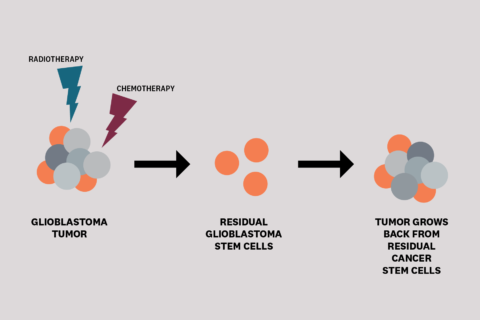USC scientists and colleagues have discovered a novel potential target for treating glioblastoma, the deadly cancer that took the life of Sen. John McCain and kills 15,000 Americans a year.
By Leigh Hopper
cientists at USC and UC San Diego have discovered a potential novel target for treating glioblastoma, the deadly brain cancer that took the life of Sen. John McCain and kills 15,000 Americans a year.
The target is the circadian “clock” found within the tumor stem cells, which governs how the tumor grows, multiplies and develops resistance to current treatments.
“We think this is opening the door to a whole new range of therapies,” said Steve Kay, Provost Professor of neurology, biomedical engineering and biological sciences at the Keck School of Medicine of USC, who is working with Jeremy Rich, a neuro-oncologist at University of California, San Diego who specializes in malignant brain tumors. “It’s a great example of collaboration and convergence.”
Kay and Rich report their findings Tuesday in Cancer Discovery.
Glioblastoma: rare but nearly always fatal

(Illustration/USC Staff)
Glioblastoma is rare but nearly always fatal, striking adults in their mid-60s. Average survival is only 15 months. That’s because this type of cancer infiltrates surrounding brain tissue, making it impossible to eradicate, even after surgery, radiation and chemotherapy. The tumor comes back, growing from stubborn cancer stem cells left behind.
Now scientists are focusing on a new potential vulnerability in those left-behind stem cells.
Kay is a pioneer in the study of circadian rhythms and the biochemical circadian clocks that regulate hundreds of activities, from sleep to digestion to body temperature.
Circadian clocks are comprised of specific protein molecules that interact in cells throughout the body, controlling how they grow, replicate and repair damage to their DNA. When circadian timing is off in cells, it can cause disease. Biological clocks that run fast or slow can result in disrupted or abnormal circadian rhythms, increasing the risk of developing cancer in some people.
When the team first examined the biological clocks of glioblastoma stem cells in the lab, Kay said the researchers found them “on steroids, on overdrive.” The cells’ circadian clock was ramping up the cells’ metabolism, making the cells stronger and more resistant to treatment and able to divide and multiply rapidly.
In collaboration with Synchronicity Pharma, a San Francisco-based biotechnology company, they used a small-molecule drug to target the proteins in the stem cells’ circadian clocks to disrupt their activity. The ramped-up metabolism abated, and the cells quickly died.
“This was a striking, amazing result nobody really predicted,” Kay said. Small-molecule drugs can enter cells easily and in this case, cross the blood-brain barrier in mouse models of the disease.
Next, the researchers tested the small-molecule drug in an animal model of glioblastoma. They found the animal models lived longer and the tumor shrank in size.
“This lays the groundwork for us to explore this as a novel therapy for glioblastoma,” Kay said. “In the near future, we’re going to do more work with animal models of the tumor and compare our new drug with the current standard of care. Perhaps we can one day contribute towards meeting this terrible unmet medical need.”
In addition to Kay and Rich, other authors are Zhen Dong, Guoxin Zhang, Ryan Gimple, Qiulian Wu, Zhixin Qiu, Briana Prager, Xiuxing Wang, Leo Kim, Deobrat Dixit, Zhe Zhu and Lukas Chavez, all of UC San Diego; Meng Qu of Keck; Andrew Morton of Case Western Reserve University School of Medicine; Wenchao Zhou, Shideng Bao and Haidong Huang of Cleveland Clinic; Bin Li of the Ludwig Institute for Cancer Research; and Stephen Mack of Baylor College of Medicine.
The work was supported by NIH grants CA197718, CA154130, CA169117, CA171652, NS087913, NS089272, DK108087, CA184090, NS091080, NS099175, CA217066, CA217065, CA203101 and CA236313.
Kay has a financial interest in the company Synchronicity Pharma, which provided the drug molecules used in the experiments. Kay is a founder of the company and a member of its scientific advisory board.
University of Southern California
